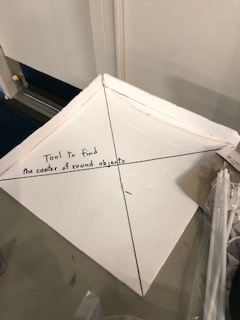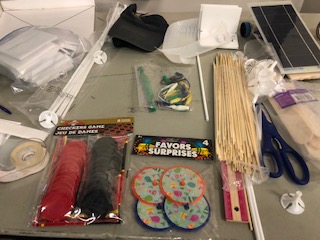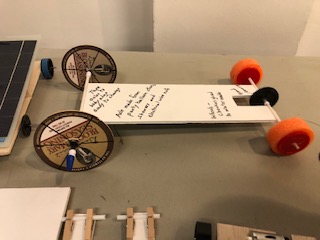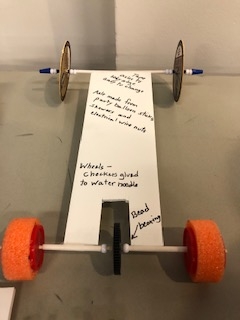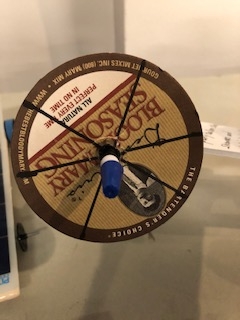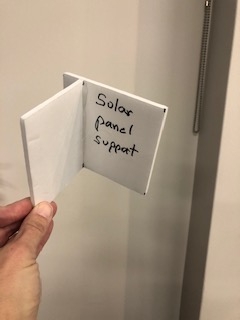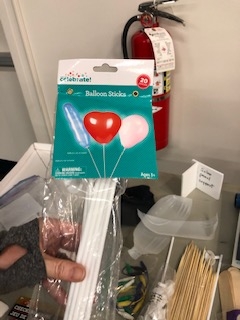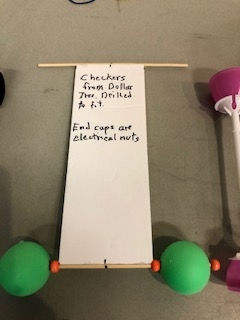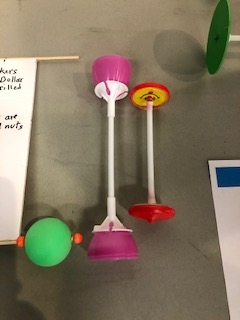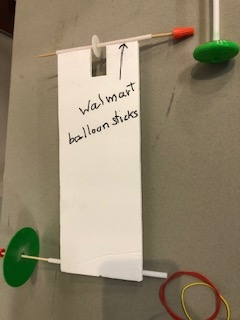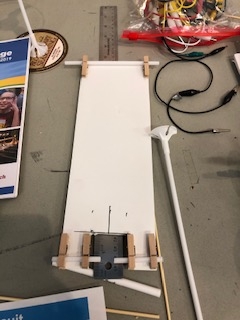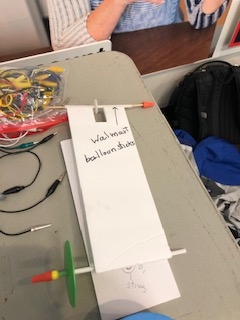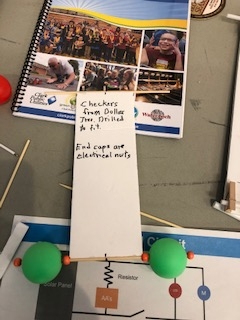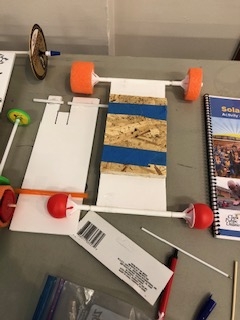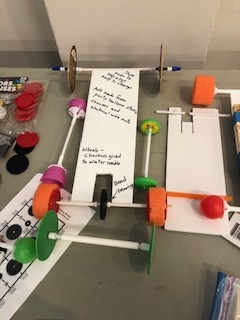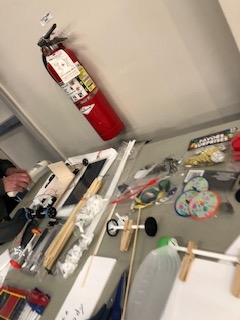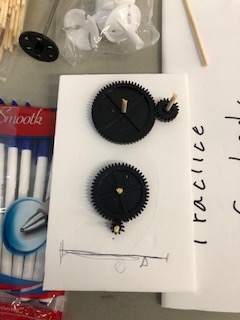Solar Car Challenge
Clark Public Utilities hosts the Solar Car Challenge for elementary, middle and high school students from districts across Clark County. Every year, hundreds of students from local schools participate in months of engineering and design work. This culminates in the construction of a working, custom-built hybrid solar and battery powered car. At the Solar Car Challenge, teams compete in an academic tournament, that includes evaluation of the team’s design and engineering processes, understanding of renewable energy principles, and a day-long, multi-heat race of the solar cars. The Solar Car Challenge occurs on the second Saturday in March at Hudson’s Bay High School in Vancouver, Washington. Registration: https://scc.clarkpublicutilities.com/login
Helpful Steps for Registration
- Each year a new registration is needed
- Click Register button (upper right corner)
- Create Teacher/Coach Profile
- Indicate the number of teams you plan to coach and we will get the kits ready
- Select District and School
- If Private, select Private and add the school name
- Select a Coaches Meeting/Car Kit Pickup date and location
- Meeting is optional, picking up kits is necessary
- Look for an email to confirm your email address
- Log in and add your team and student names
Important dates:
- Registration Opens: Wednesday, November 15, 2023
- Registration Ends: Saturday, December 23, 2023
- Team Maintenance Begins: Wednesday, December 6, 2023
- Technical Support Help Day: Saturday, February 17, 2024
- Team Maintenance Ends: Friday, March 1, 2023
- All team and student names must be entered
- Remove any teams not attending the academic challenge
- Clark Public Utilities Solar Car Challenge: Saturday, March 9, 2024
Looking for the guide, scoring, judging and other documents? You can find them all at the bottom of the page.
The goals of the Solar Car Challenge program goals and expectations:
- Provide an educational and engaging hands-on engineering competition for as many Clark County students as possible
- Extend student learning at all grade levels beyond the classroom with relevant curriculum and real-world, hands-on engineering experience
- Provide students the opportunity to test engineering and innovation skills, and to experience teamwork, failure, success, dedication and perseverance – in a way comparable to an athletic team competition
- Allocate customer funds contributed through the Green Lights program in a responsible and equitable way
Coach Orientation
How to Build a Solar Car
Event Overview
Registration
Gear up for the annual Solar Car Challenge – a popular Engineering and Design competition for Elementary, Middle and High School Students – and get the wheels turning in your school! Each team will receive FREE basic solar car kits, funded by Clark Public Utilities Green Lights Program. Participants will be limited to 5 teams (car kits) per class and/or 10 teams total per school. Registration for the Clark Public Utilities Solar Car Challenge opens in November and closes in December.
Required Coach Meetings and Car Kit Pick Up
Once you’ve registered your teams online, sign up to attend one Coach Information/Car Kit Pick Up Meeting. This year all car kits, coach’s manual and teaching materials will be distributed in person at the coach meetings hosted in December at the Clark Public Utilities. We are offering two dates at different locations. The Community Room: 1200 Fort Vancouver Way, Vancouver, WA 98663 or Operations Education Center: 8600 NE 117th Ave., Vancouver, WA 98668. Dates in registration.
First Time Coach? Attend An Information Meeting
Sign up for an information session hosted in December. This is your on-ramp to a successful Solar Car Challenge coaching experience. You’ll learn about renewable energy technology, the nuts and bolts of the solar car build and how to lead your student teams through the competition experience. Space is limited so do not delay. Once you attend this session you’ll be in a good position to register your teams and register for a required coach information/car kit pick up meeting. Dates provided in registration portal.
If you have questions or need additional information email Amber Hall, Education Engagement Specialist, at [email protected].
Vehicle and Other Challenge Requirements
Must use the following provided materials:
- 2- AA Batteries
- DC Motor
- Solar Panel
- A switch that disconnects batteries from circuit
High School Must add/include:- Resistor (in series)
- 1 LED in circuit
Design Documentation:- Power (trifold/table top) (picture examples)
- Engineering Notebook (picture examples)
- Support during poster presentations and interviews
- Vehicle Circuitry
- Design a circuit with the following criteria and constraints: (picture example & diagram example)
- Must use 2-AA batteries, solar panel, and motor
- Student team kits will include a battery holder with a built-in switch
- Design your own switch, or model where it will go
- Batteries must be wired in series with switch
- Motor must spin
- HIGH SCHOOL: Include 1+ Red LED light and resistor wired in series with batteries and switch
- Must use 2-AA batteries, solar panel, and motor
- The optimized circuit will have the batteries and the solar panel in parallel with each other
- A series circuit (one long chain) is unlikely to be able to move the vehicle, especially in low-light conditions
- Design a circuit with the following criteria and constraints: (picture example & diagram example)
Equipment Sizes
Track Size:
- ~6 meters long
- 31.75 centimeter-wide lanes
- Starting gate at 40 centimeters
- Lights positioned 32 inches above the track
- Illumination at 3 inches above track is a minimum 500 watts halogen lights
Track Materials:- PVC Sides (1” diameter)
- Gym Floor
Max Vehicle Size:- 38 centimeters long
- 30 centimeters wide
- 30 centimeters tall
Disqualifying Actions
- Using solar panel as the body (chassis) of vehicle
- Modifying the Solar Panel in any way that makes it less or on reusable
- Using additional or changing existing motor in any way (aside from attaching it into a circuit)
- Adding additional power sources
- Purchasing materials costing greater than a total of $10.00
Activity Guide
Overview
- Left open for modification in the classroom
- Focus on providing general structure for engineering process
- Tools to build process into engineering notebooks
- Developed closest to middle school grade bands in order to scale up or down easier
Safety Tips
- Do Not Short Circuit Batteries!
- Remove batteries from battery holder for storage – this will prevent a short circuit
Judging Criteria
Scoring Criteria
Interview Questions
Teacher Tips
- Send supplemental documents to parent/guardian:
- Event map
- Event schedule
- Team Number
- Go over qualification checklist (page 63 and 64 in the Teacher and Judging Guide)
- Prepare your team for interview questions (page 68 and 69 in Teacher and Judging Guide)
- Pizza will be served to participating students and coaches only. Students/Teachers will receive Pizza tickets upon registration.
- Be sure students have packed team poster and all engineering notebooks to bring to the challenge.
- Coaches of teams in the first four heats in the Elementary School division will be notified ahead of the competition. These teams will have priority at the Qualifying table.
- Pack a kit of supplies/materials for emergency repairs.
Day of Challenge Tips
- Each team MUST have an adult chaperone/teacher. There will be separate packets for individual teams and a separate teacher packet for each coach.
- There will be a Solar Car Challenge website and TV screens displaying the live bracket movement. Prep students to be aware of their next race.
- If a team misses a race, it counts as a loss.
- Encourage students to bring a water bottle and snacks.
- Bring materials to pass the time.
- Board games
- Cards
- Classroom assignments
- Books
- Journal
- Bring a camera and have students document their experience.
- Send supplemental documents to parent/guardian:
Marvelous Modifications
Part of the engineering process is to look at everyday items and find alternative uses for them. Modifications of the solar car are allowed, but with a cap of no more than $10.00 it will take some outside the box thinking to get a leg up on the competition. Here are some examples of inexpensive items that can be used on the hybrid cars.
Participation Cap and Pre-Qualifying for the Challenge
The level of participation is exciting! We appreciate the enthusiastic response to the Solar Car Challenge. While we would love to include all teams in the event, the venue and time constraints simply will not accommodate everyone interested. We’ve had to make the difficult decision to limit the number of teams that can compete at the county-wide event. The limit is 10 teams, per school, in the grade divisions (elementary, middle, and high school). This will ensure that all schools are represented. Each school conducts their team participation differently, so it is up to you to determine which teams will advance to the challenge. Please see below some best practices to help in your team selection. Please do not hesitate to reach out for ideas on how to make the pre-qualifying experience valuable for your students.
Intramural Races
- Refer to page 35 and 36 in your Activity and Judging Guide for suggestions on how to set up conditions for the race
- Refer to page 56 to 71 in your Activity and Judging Guide for judging criteria
- These should be held as close to the race as possible to provide students enough time to engage in the engineering design process – cars should be race ready
Engineering Notebooks
- Create a rubric relevant to your classroom goals or borrow the rubric on page 66 in the Activity and Judging Guide to review and score student engineering notebooks
- Build classroom activities around student engagement in the engineering notebooks
- Review student progress on engineering notebooks and select students that have the most detailed notebooks
Mock Interviews
- Create a rubric relevant to your classroom goals or borrow the rubric on page 67 in the Activity and Judging Guide to score student interviews
- Prepare students with interview questions on page 68 and 69 in the Activity and Judging Guide
- Invite school volunteers to support students in prepping for interviews (great option if you have a steady group of volunteers)
- Prepare a panel of judges to perform mock interviews with student teams
Overall Performance
Select students that are most engaged in the process and have demonstrated excellence in the three categories above
-
Solar Car FAQ
-
Do I have to give back the solar car kit after the event?
We would like the solar panels returned to Clark Public Utilities. This will help us keep costs down and continue the program. Pick up can be arranged with Amber Hall ([email protected]) and your schools office. All other components are yours to keep. We hope some can be used on future cars entering the competition.
-
Why are there so many Clark Public Utilities employees at this event?
The Solar Car Challenge is one of our signature events and easily draws many employees to volunteer their time, yep – they are volunteering a portion of their Saturday to have fun with your students. We are always amazed at the ingenuity, friendly competition and excellent communication of the design and problem solving process. We also love the excitement of the race!
-
How are you working toward making this event greener?
Great question. For the 2022-2023 Solar Car Challenge season all packaging/kit distribution has been reviewed. We’ve reduced the amount of plastic bags and boxes and will now give kits out in a reusable shopping bag. Notes have been made to further reduce waste in the 2023-2024 season, and that practice will continue. We also encourage students to upcycle items for modifications on their cars.
-
Why do you need my student’s names?
Entering student’s names on their teams will help us know how many kids are going to be at competition. First name and last initial is fine, and all team information is purged at the end of the competition.
-
I’ve registered, that should be enough.
Thank you for registering. We understand life gets busy and that could keep a coach from participating at competition in March. By entering team names, we can identify who expressed interest and who will actually be coming to the event. This helps us prepare for the number of people attending, aids in building brackets, and will help us identify obstacles that kept other coaches from competition.
-
We are given rechargeable batteries in the kits, but I know they lose their oomph over time. Do the kids have to use these batteries in competition?
Race batteries will be provided for the competition car on race day. These batteries will be found in the team packet handed out at check in.
-
Why are batteries part of the car if this is a solar car?
This is a battery powered car with a solar boost. Students do not wire the necessary components for charging into their cars – so the solar panel is like a Mario Kart boost to the battery power.
-
Do I have to enter team names on the registration portal?
Yes, please add in team names for each team coming to competition. This helps us organize the race brackets and allows students to find their heat easily. Unique names are best verses Team 1, or Team A as many other schools could do the same (not recommended).
-
I’ve done this before, do I have to attend a Coaches’ meeting?
We respect your time and understand that you are busy. We have reduced the length of the meetings and will be succinct with competition overviews and important information. We also want you there because your experience is valuable to new coaches and your feedback helps us make the challenge successful. At the end of the informational session solar car kits will be made available for pick up.
-
Can I have parent helpers?
Absolutely!
-
Our school has K-12, are we limited to ten teams since we are one school?
Each grade band will have the opportunity to send teams to the event in March. This school could send 30 teams, ten per grade band.
-
I am not mechanically inclined and am not sure I can lead students to build their own.
That’s okay! We have multiple tech support days scheduled leading up to the competition. Bring your students, or just yourself, and a team of volunteers will assist with the process. We will also have a video on PowerZone to show how one of our staff built their solar car.
-
Do I have to do this as an afterschool program? Do I have to do this as part of my curriculum?
We encourage you to work with your administrator on what will be best for your time and for the students. We do provide a stipend if all competition work is done outside of regular work hours.
-
What is a good number of students per team?
We have had teams of two and teams of six with all combinations in between compete on race day. The number of team members will depend on the level of interest from your students and the team limits per school.
-
Can one coach have all ten teams at our school?
Yes.
-
I registered but I didn’t get a confirmation and cannot log in to add teams.
When you register we manually go in to confirm your email address. Once that has been done you will be able to add teams. We check the registration portal at least once a day during work hours.
-
What are the grades in each band?
Elementary is Kindergarten through fifth, middle is sixth through eighth and high school is ninth through twelfth.
-

